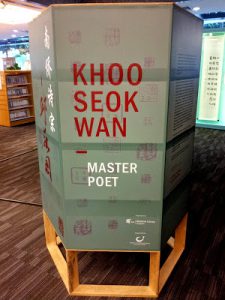The Poetry of Early Chinese Immigrants in Singapore
March 20, 2022

March 21 was declared to be World Poetry Day by the United Nations Educational, Scientific and Cultural Organization (UNESCO) in 1999, and has been celebrated annually ever since. Poetry has been practiced throughout history, and is present in every culture and on every continent of the planet. World Poetry Day thus celebrates one of humanity’s most treasured forms of cultural and linguistic expression and identity.
Zhuzhici is a form of Chinese poetry that was prevalent among Chinese migrants in Singapore during the colonial era. These poems convey the experiences of the diasporic Chinese as they navigated their way through the foreign landscape of Singapore’s local culture.
Associate Professor Lam Lap (NUS Department of Chinese Studies) analyses zhuzhici poems in “Poetic Record of Local Customs: Bamboo Branch Verses of Singapore (1888–1941)” (Journal of Chinese Overseas, 2019) to explicate the historical value of the genre. While A/P Lam delves deeper into the poet Khoo Seok Wan’s verses, the tradition of writing zhuzhici and its position as a social commentary are also explained in detail.
This style of poetry is characterised by some distinct features including a cyclic, seven-syllabic form that explores the topics of local ecoculture and regional cultures. Zhuzhici poems can take on a humorous or satirical tone while intermittently adopting local vernacular. The poems are generally intelligible to the average reader.
As Zhuzhici poems elucidate the opinions Chinese immigrants had of Nanyang, they serve as social narratives that give the contemporary reader a glimpse into the past. Although it was rather common for the male Chinese scholars to frequent brothels, they would adopt a moralistic stance in their poems to educate other Chinese immigrants to resist the temptation to indulge in the colourful Nanyang culture. Through the zhuzhici poems, the localisation of Chinese immigrants is also apparent as they gradually embrace the ways of their new society.
Khoo Seok Wan’s Bamboo Branch Verses cover an array of topics that illustrate various facets of local society through the medium of zhuzhici. His collection of poems embodies the diasporic voice of early Chinese immigrants who adapted to a foreign culture and experienced key political and historic moments before the Japanese Occupation. With his affluence, Khoo Seok Wan was able to publish his own work in newspapers and communicate with the diasporic Chinese through zhuzhici.
Read the full article here.
